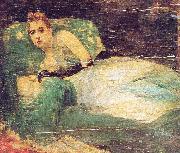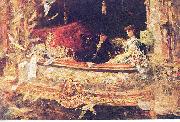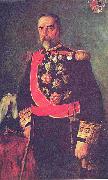Juan Luna Oil Painting ReproductionAll Juan Luna Oil PaintingsJuan Luna y Novicio (October 23, 1857 - December 7, 1899) was an Ilocano Filipino painter, sculptor and a political activist of the Philippine Revolution during the late 19th century. He became one of the first recognized Philippine artists. His winning the gold medal in the 1884 Madrid Exposition of Fine Arts, along with the silver win of fellow Filipino painter Felix Resurreccien Hidalgo, prompted a celebration which was a major highlight in the memoirs of members of the Propaganda Movement, with the fellow Ilustrados toasting to the two painters' good health and citing their win as evidence that Filipinos and Spaniards were equals. Regarded for work done in the manner of the Spanish and French academies of his time, Luna painted literary and historical scenes, some with an underscore of political commentary. |
|||

|
|||
|
|
|||
|
||||||||
| Juan Luna Juan Luna y Novicio (October 23, 1857 - December 7, 1899) was an Ilocano Filipino painter, sculptor and a political activist of the Philippine Revolution during the late 19th century. He became one of the first recognized Philippine artists. His winning the gold medal in the 1884 Madrid Exposition of Fine Arts, along with the silver win of fellow Filipino painter Felix Resurreccien Hidalgo, prompted a celebration which was a major highlight in the memoirs of members of the Propaganda Movement, with the fellow Ilustrados toasting to the two painters' good health and citing their win as evidence that Filipinos and Spaniards were equals. Regarded for work done in the manner of the Spanish and French academies of his time, Luna painted literary and historical scenes, some with an underscore of political commentary. |
||||||||
|
|
||||||||
| Gemälde IDENTIFIZIERUNG:: 83535 Despues del Baile Despues del Baile (After the Dance) painting by Juan Luna. Date circa 1880s cjr |
||||||||
|
|
||||||||
| Gemälde IDENTIFIZIERUNG:: 83536 En el Balcon En el Balcon painting by Filipino painter and hero Juan Luna. Date 1884(1884) cjr |
||||||||
|
|
||||||||
| Gemälde IDENTIFIZIERUNG:: 83537 Espana y Filipinas España y Filipinas, 1886 oil on canvas painting by Filipino painter Juan Luna. cjr |
||||||||
|
|
||||||||
| Gemälde IDENTIFIZIERUNG:: 83538 Portrait of Governor Ramon Blanco Portrait of Governor Ramon Blanco by Juan Luna. Date circa 1880s cjr |
||||||||
|
|
||||||||
| Gemälde IDENTIFIZIERUNG:: 83539 Idilio Idilio painting by Juan Luna. Date circa 1880s cjr |
||||||||
|
|
||||||||
| VORHERIGER KÜNSTLER NÄCHSTER KÜNSTLER | ||||||||
|
|
||||||||
|
Juan Luna Juan Luna y Novicio (October 23, 1857 - December 7, 1899) was an Ilocano Filipino painter, sculptor and a political activist of the Philippine Revolution during the late 19th century. He became one of the first recognized Philippine artists. His winning the gold medal in the 1884 Madrid Exposition of Fine Arts, along with the silver win of fellow Filipino painter Felix Resurreccien Hidalgo, prompted a celebration which was a major highlight in the memoirs of members of the Propaganda Movement, with the fellow Ilustrados toasting to the two painters' good health and citing their win as evidence that Filipinos and Spaniards were equals. Regarded for work done in the manner of the Spanish and French academies of his time, Luna painted literary and historical scenes, some with an underscore of political commentary. |
||||||||
|
|
||||||||
|
KONTAKTIEREN Sie UNS |










